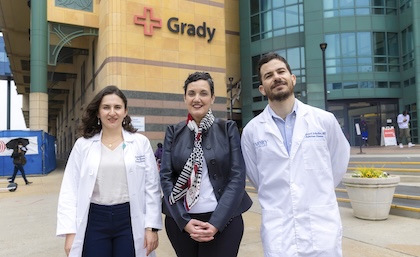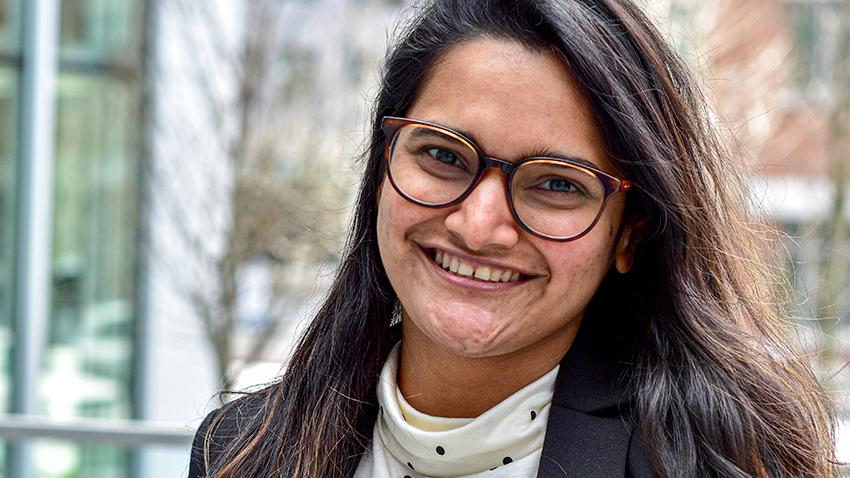
Research 2023: From Lab to Life
2023 was a transformative year for the College of Computing community. The following is an excerpt from the College's recently published annual report.
Helping people is what the College’s research community is all about. From transforming pandemic prevention strategies to promoting financial inclusivity to combating robocalls and beyond, faculty and student researchers are pioneering breakthrough technologies that lead to real solutions for real-world challenges.
Computing researchers have been active in disease prevention efforts since the start of the pandemic. In Sept. 2022, School of CSE Associate Professor B. Aditya Prakash joined a new effort to transform the science of pandemic prediction and prevention by bridging research methodologies between hard and soft sciences.

Prakash is leading a multidisciplinary, multiorganizational team seeking to prevent disease outbreaks by integrating the study of human behavior with data-driven models. The $1 million National Science Foundation grant aims to develop high-fidelity computational models using novel machine-learning techniques to connect human behavioral knowledge and traditional epidemiological theory and models.
“While epidemic forecasting is compared to weather forecasting, there is an important difference. Unlike weather, our actions and behavior can change the course of an epidemic,” Prakash said.
[EXPLORE: 2023 College of Computing Annual Report]
School of CSE Ph.D. student Zijie (Jay) Wang is helping people better weather potential financial storms. with a first-of-its-kind tool that revolutionizes how people with rejected loan applications navigate financial setbacks.
GAM Coach is an interactive web-based tool that uses AI and a unique algorithm to offer personalized advice and guidance, empowering individuals to make informed decisions. This level of personalization means GAM Coach generates recourse options that are realistically actionable for individual loan applicants, which can help ensure better future outcomes.
“We can’t assume that developers can make the best decisions for everyone,” Wang said. “Our goal is to give agency to the end user, so we developed GAM Coach to give people actionable recourse in scenarios like loan applications.”
College researchers are also working to help people with diabetes. School of IC Associate Professor Rosa Arriaga is developing an app for patients with diabetic foot ulcers — a severe complication for more than one-third of people with diabetes.
If left untreated, a diabetic foot ulcer can become infected, leading to amputation. Arriaga aims to prevent this situation by creating an app to detect, track, and report on the condition of ulcers. Arriaga partnered with researchers and doctors from the Emory School of Medicine and Grady Memorial Hospital to create the app.
Their work gained support from the American Diabetes Association, which awarded a grant to the team in January. Arriaga and her collaborators were among the first recipients of the AI Humanity Seed Grant Program, a collaborative effort between Georgia Tech and Emory University to expand partnerships and leverage artificial intelligence to improve society and quality of life.

Researchers from the School of CP are improving the quality of life for smartphone users by taking on robocalls. Created by alumna Sharbani Pandit (CS Ph.D. 21), RoboHalt uses machine learning and natural language processing to intercept and screen incoming calls for spam. The smartphone-compatible virtual assistant successfully blocked 95% of mass robocalls, 82% of evasive robocalls, and 75% of targeted robocalls in Pandit’s research.
Traditional methods of blocking robocalls use blocklists, which are ineffective against caller ID spoofing. RoboHalt solves this problem by intercepting the call and randomly asking the caller to hold or continue the conversation. The program asks questions like “Who are you trying to reach?” and “Can you tell me more about it?” to unknown callers and determines if RoboHalt should put the call through.
“A phone call from a number not saved in a contact list would get picked up by the virtual assistant, which would then screen the caller,” Pandit said. “If the caller is a robot and cannot answer the assistant’s questions, the call is terminated. If the caller passes, the call and a screening transcript are forwarded to the user.”
Also helping out people at home, School of CS researchers are working to help pet owners worried about sick or elderly animals. Assistant Professor Ashutosh Dhekne and his research students presented PetTrack in July 2022 at a leading workshop on body-centric computing systems.
The approach uses wireless ultra-wideband (UWB) radio sensors and accelerometers to give an accurate, real-time indoor location of a cat, dog, or other domestic pet. It can also tell if a pet is on the move, standing, sitting, or lying down, regardless of objects or walls, the block cameras and GPS.
“Overall, the idea is to connect better with your pet. You can detect changing behaviors and interact with your pet using location-aware robotic toys,” Dhekne said.
As computing revolutionizes research in science and engineering disciplines and drives industry innovation, Georgia Tech leads the way, ranking as a top-tier destination for undergraduate computer science (CS) education. Read more about the college's commitment:… https://t.co/9e5udNwuuD pic.twitter.com/MZ6KU9gpF3
— Georgia Tech Computing (@gtcomputing) September 24, 2024


